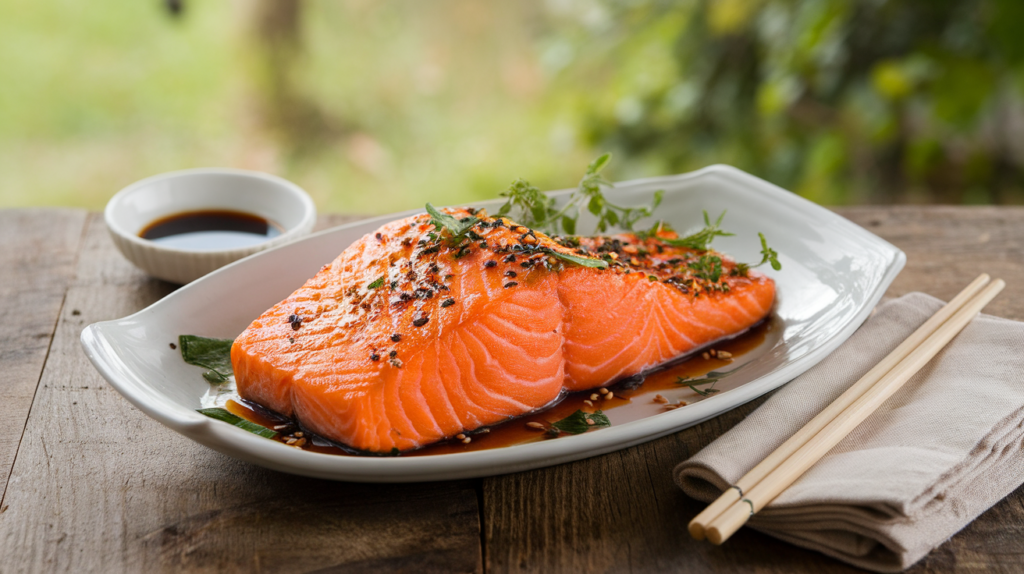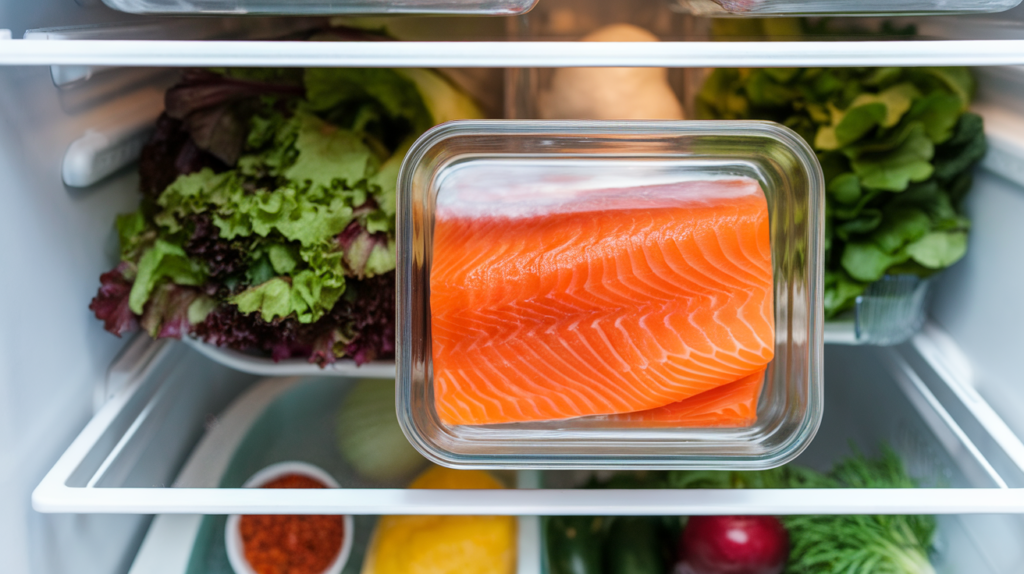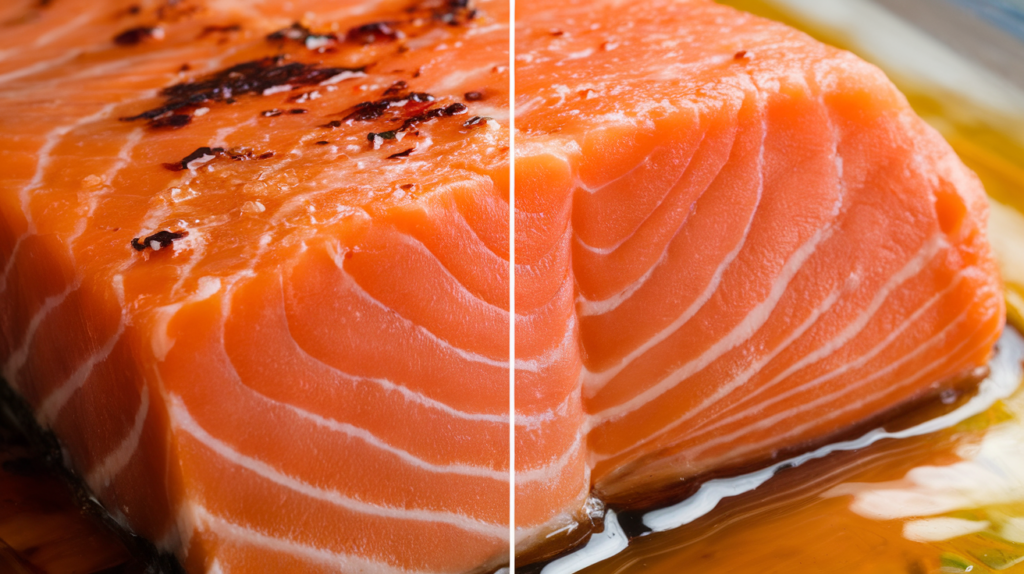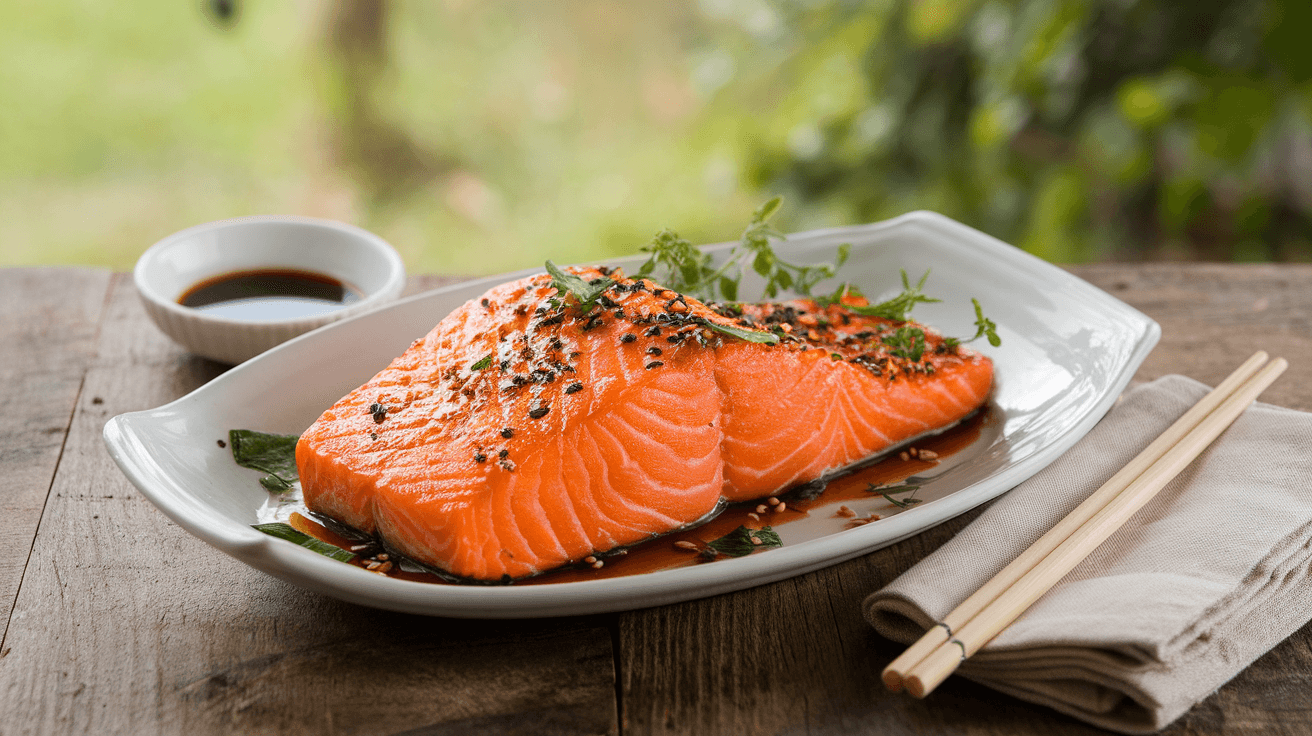Introduction
Soy marinated salmon is a flavorful and versatile dish that combines the rich, savory taste of soy sauce with the delicate texture of fresh salmon. Whether you’re preparing it as a main course or for sushi, knowing how long it lasts is crucial for ensuring freshness and safety. Improper storage can lead to spoilage, which not only ruins the taste but also poses health risks.

This article dives deep into the shelf life of soy marinated salmon, discussing various factors that affect its longevity, storage tips, and signs of spoilage. By following the advice outlined here, you can enjoy your soy marinated salmon at its best quality while avoiding unnecessary food waste.
Factors Influencing the Shelf Life of Soy Marinated Salmon
How the Quality of Salmon Affects Its Shelf Life
The freshness of the salmon you use plays a pivotal role in determining how long it will last after marination. Fresh, high-quality salmon will maintain its texture, flavor, and safety for a longer period compared to fish that is close to its expiration date. Always check for clear eyes, bright skin, and a mild ocean smell when purchasing fresh salmon.
How Marinade Ingredients Impact the Shelf Life of Soy Marinated Salmon
The components of your soy marinade also affect shelf life. Soy sauce, known for its high salt content, acts as a natural preservative. However, additional ingredients like garlic, ginger, or citrus juice might slightly reduce the shelf life if not stored correctly. Ensure a balanced marinade ratio to enhance both flavor and preservation.
Storage Methods
How you store soy marinated salmon significantly impacts its longevity. Refrigeration slows bacterial growth, while freezing can halt it almost entirely. On the other hand, leaving marinated salmon at room temperature for extended periods increases the risk of spoilage. Choosing the right storage method is essential for maximizing freshness.
How Long Does Soy Marinated Salmon Last in Different Storage Methods?
How Marinade Ingredients Impact the Shelf Life of Soy Marinated Salmon
When stored in the refrigerator, soy marinated salmon typically lasts 2 to 3 days. The cold temperature slows down bacterial growth, but the marinade’s acidity and moisture content can still promote slight changes in texture over time. To maximize shelf life, ensure the salmon is kept in an airtight container or tightly sealed bag to prevent cross-contamination and moisture loss.
In the Freezer
Freezing extends the shelf life of soy marinated salmon significantly, up to 2 to 3 months. Before freezing, place the salmon in a freezer-safe bag or container, removing as much air as possible. This minimizes freezer burn and preserves the marinade’s flavor. For best results, label the container with the date of freezing and consume the salmon within the recommended timeframe for optimal quality.
At Room Temperature
Leaving soy marinated salmon at room temperature is not recommended, as it becomes unsafe to eat after 2 hours. The marinade does not provide sufficient protection against bacterial growth at warmer temperatures. Always refrigerate or freeze the salmon promptly after preparation to ensure safety and freshness.
Best Practices for Storing Soy Marinated Salmon for Maximum Freshness

Refrigeration Tips
To keep soy marinated salmon fresh in the refrigerator, use an airtight container or a resealable plastic bag. This helps prevent the fish from absorbing odors from other foods and retains the marinade’s flavor. Ensure the refrigerator is set to a temperature below 40°F (4°C). Store the salmon on the coldest shelf, typically near the back of the refrigerator, to maintain consistent cooling.
Freezing Techniques
Freezing is an excellent option for extending the shelf life of soy marinated salmon. Before freezing, pat the salmon dry to prevent excess ice crystals from forming. Use a freezer-safe bag or container and press out as much air as possible to avoid freezer burn. If you plan to store it for longer than a month, double-wrap it in plastic wrap before placing it in the bag or container for extra protection.
Suitable Containers
The choice of storage containers can make a significant difference. Glass containers with tight-fitting lids are ideal for refrigeration as they prevent chemical interactions with the marinade. For freezing, heavy-duty plastic bags or vacuum-sealed bags are the best choices. Avoid using flimsy plastic wrap or containers with loose lids, as they may allow air and moisture to compromise the quality of the salmon.
Signs That Soy Marinated Salmon Has Spoiled

Signs of Spoilage: Smell and Texture Changes in Soy Marinated Salmon
A strong, sour, or ammonia-like odor is a clear sign that soy marinated salmon has spoiled. Fresh marinated salmon should have a pleasant, savory aroma from the marinade. Additionally, the texture of spoiled salmon becomes slimy or excessively mushy, which indicates bacterial growth. Always trust your senses—when in doubt, throw it out.
Detecting Spoiled Soy Marinated Salmon: Color and Appearance Changes
Spoiled soy marinated salmon may develop an off-color, such as a dull or grayish hue. Fresh salmon should have a vibrant appearance, enhanced by the marinade’s soy-based brown tones. If you notice discoloration, mold, or an oily sheen, the salmon is no longer safe to eat and should be discarded.
Taste Alterations
If you’re unsure about the salmon’s freshness and decide to taste it, be cautious. Spoiled salmon often has a bitter or “off” taste that doesn’t align with the marinade’s expected flavors. Consuming even a small amount of spoiled salmon can lead to foodborne illness, so it’s better to err on the side of caution and avoid tasting questionable fish.
Can You Reuse the Marinade?
Risks of Reusing Marinade
Reusing marinade that has been in contact with raw salmon poses significant health risks. The raw fish can introduce harmful bacteria such as salmonella or listeria into the marinade. Using the same marinade on other foods without proper treatment can lead to cross-contamination and foodborne illnesses.
Safe Practices for Reusing Marinade
If you wish to reuse the marinade, it must be boiled for at least 5 minutes to kill any bacteria present. Alternatively, reserve a portion of the marinade before adding the raw salmon. Use this untouched portion as a basting sauce or dipping sauce to enjoy the flavors safely without risking contamination.
Health Risks of Consuming Spoiled Salmon
Common Foodborne Illnesses
Consuming spoiled soy marinated salmon can lead to foodborne illnesses caused by harmful bacteria such as Salmonella, Listeria, or E. coli. These microorganisms can proliferate rapidly in improperly stored fish, posing serious health risks. Spoiled salmon may also harbor toxins that are not destroyed by cooking or freezing, making early detection of spoilage critical.
Symptoms of Food Poisoning
Symptoms of food poisoning from spoiled salmon typically appear within hours to a few days of consumption. They may include nausea, vomiting, diarrhea, abdominal pain, and fever. In severe cases, dehydration, neurological symptoms, or complications may occur, particularly in young children, pregnant women, and individuals with weakened immune systems.
Preventing Health Risks
The best way to avoid health risks is by practicing proper storage and handling. Ensure the salmon is always refrigerated or frozen promptly and discarded if there are signs of spoilage. Adhering to safe food practices not only protects your health but also enhances your enjoyment of delicious soy marinated salmon dishes.
Tips for Extending the Shelf Life of Soy Marinated Salmon
Use Fresh Ingredients
Starting with the freshest possible salmon and marinade ingredients is key to maximizing shelf life. Fresh fish lasts longer and retains its flavor better, while high-quality soy sauce and spices ensure the marinade acts as an effective preservative. Check the expiration dates of all ingredients before use.
Vacuum Sealing
Vacuum sealing is one of the best methods to extend the freshness of soy marinated salmon. By removing air, it prevents oxidation and slows bacterial growth. Vacuum-sealed salmon can last an additional 1-2 days in the refrigerator and up to 6 months in the freezer without losing quality.
Store at Consistent Temperatures
Fluctuating temperatures can hasten the spoilage process. Always store soy marinated salmon in the coldest part of your refrigerator, and ensure your freezer maintains a constant temperature of 0°F (-18°C). Avoid leaving marinated salmon on the countertop for extended periods, even during preparation.
Quick Freezing
For the best results, freeze the salmon as quickly as possible after marinating. Rapid freezing helps preserve texture and flavor by preventing large ice crystals from forming. Use a flash freezer if available, or ensure the salmon is laid flat in a thin layer before placing it in the freezer.
Consider Individual Portions
Instead of marinating a large piece of salmon, divide it into smaller portions. This makes it easier to store and allows you to use only what you need, minimizing the risk of repeated thawing and refreezing, which can compromise quality and safety.
How Marination Affects Salmon’s Shelf Life
The Role of Soy Sauce
Soy sauce plays a crucial role in extending the shelf life of marinated salmon. Its high salt content acts as a natural preservative by reducing bacterial growth. Additionally, soy sauce helps maintain the salmon’s moisture, preventing it from drying out during refrigeration or freezing.
The Impact of Acidic Ingredients
Acidic ingredients like lemon juice or vinegar are common in soy marinades. While they enhance flavor, they also tenderize the salmon by breaking down proteins. This can be beneficial for taste but may reduce the fish’s structural integrity over time, particularly if marinated for too long.
Spices and Aromatics
Garlic, ginger, and other spices in the marinade provide antimicrobial properties, contributing to shelf life extension. However, they also add moisture to the mix, which can create an environment where spoilage may occur more quickly if not stored properly.
Duration of Marination
Marinating salmon for the right amount of time—generally between 30 minutes and 2 hours—ensures the flavors are absorbed without compromising texture. Over-marinating can lead to a mushy texture, which not only affects the taste but may also make the fish more susceptible to spoilage.
Proper Handling During Marination
Always marinate salmon in the refrigerator, not at room temperature. This prevents bacterial growth during the marination process. Use a clean, non-reactive container like glass or stainless steel to avoid chemical reactions that might alter the marinade or the fish.
Frequently Asked Questions (FAQ)
Can soy marinated salmon last longer with vacuum sealing?
Yes, vacuum sealing can significantly extend the shelf life of soy marinated salmon. By removing air, vacuum sealing reduces the risk of bacterial growth and freezer burn, allowing refrigerated salmon to last up to 4 days and frozen salmon up to 3-4 months.
How long can cooked soy marinated salmon last?
Cooked soy marinated salmon typically lasts 3-4 days in the refrigerator. Store it in an airtight container to maintain its flavor and texture. If freezing, it can last up to 2 months while preserving quality.
Does adding more soy sauce increase shelf life?
While soy sauce has preservative properties, simply adding more will not significantly extend the shelf life of marinated salmon. Proper storage in the refrigerator or freezer remains essential for safety and freshness.
Is it safe to refreeze soy marinated salmon?
Refreezing soy marinated salmon is safe only if it was thawed in the refrigerator and has not been left out at room temperature for more than 2 hours. However, refreezing may slightly affect the texture and flavor of the fish.
Can you marinate salmon too long?
Yes, over-marinating salmon can lead to a mushy texture due to the acidic components breaking down the fish’s protein structure. For best results, marinate salmon for 30 minutes to 2 hours, depending on the recipe.
What is the best way to thaw frozen marinated salmon?
The safest way to thaw frozen marinated salmon is in the refrigerator. Allow it to defrost slowly overnight. Avoid thawing at room temperature to prevent bacterial growth.
Conclusion
Soy marinated salmon is a delightful and versatile dish, but proper storage is essential to maintain its quality and safety. Factors like the salmon’s freshness, marinade ingredients, and storage methods significantly affect its shelf life. Refrigerated salmon can last up to 3 days, while freezing extends its usability to 2-3 months.
By following the storage tips outlined in this article and being vigilant about signs of spoilage, you can enjoy soy marinated salmon safely. Always prioritize food safety to prevent waste and ensure the best culinary experience.

